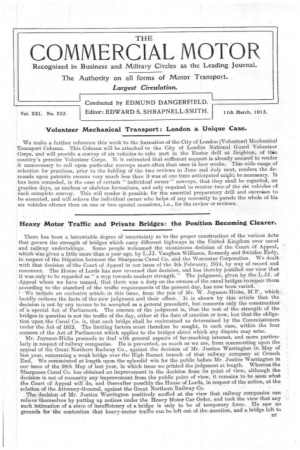Heavy Motor Traffic and Private Bridges: the Position Becoming Clearer.
Page 1

If you've noticed an error in this article please click here to report it so we can fix it.
There has been a lamentable degree of uncertainty as to the proper construction of the various Acts that govern the strength of bridges which carry different highways in the United Kingdom over canal and railivay undertakings. Some people. welcomed the unanimous decision of the Court Of Appeal, which: Nks given a little more than a year ago, by L.JJ. Vaughan Williams, Kennedy and Swinfen Eady, in respect of the litigation between the Sharpness Canal Co. and the Worcester Corporation. We dealt with that decision of :the. Court of Appeal in our issue of the 5th February, 1914, by way of record and • comment. The House of Lords has now reversed that decision, and has thereby justified our view that it wa,s.only to be regarded as" a step towards modern strength." The judgment, given by the L.JJ. of Appeal whom we have named, that there was a duty on the owners of the canal bridges to repair them according to the standard of the traffic requirements of the present day, has now been varied. We include an exclusive article-in this issue, from the pen of Mr. W. Joynson-Hicks., M.P., Which.. lucidly reviews the facts of the new judkpnent and their effect. It is shown by this article that the decision is not by any means to be accepted as a general precedent, but concerns only the construction . of .a special Act of Parliament. The essence of the judgment is, that the test of the strength of the bridges in question is not the traffic of the day, either at the date of erection or now, but that, the obligation upon the Canal Co. is, that each bridge shall be maintained as determined by the Commissioners under the Act of 1812. The limiting factors must therefore be sought, in each case, within the four corners of the Act of Parliament which applies to the bridges about which any dispute may arise. Mr. Joynson-Hicks proceeds to deal with general aspects of far-reaching interest, and more particularly in respect of railway companies. He is prevented, as much as we are, from commenting upon the appeal of the Great Northern Railway Co., against the decision of Mr. Justice Warrington in May of last year, concerning a weak bridge over the High Barnet branch of that railway company at Crouch End. We commented at length upon the splendid win for the public before Mr. Justice Warrington in our issue of the 28th May of last year, in which issue we printed the judgment at length. Whereas the Sharpness Canal Co. has obtained an improvement in the decision from its point of view, although the decision is not of necessity any improvement from the public point of view, it remains to be seen what the Court of Appeal will do, and thereafter possibly the House of Lords, in respect of the action, at the relation of the Attorney-General, against the Great Northern Railway Co. The. decision of Mr. Justice Warrington positively scoffed at the view that railway companies can relieve themselves by putting up notices under the Heavy Motor Car Order, and took the view that any such intimation of a state of insufficiency of a bridge is only to be of temporary force. He saw no grounds for the contention that heavy-motor traffic can be left out of the question, and a bridge left to





















